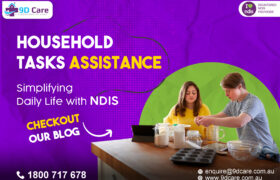- Be Your Personal Best
Warning: foreach() argument must be of type array|object, string given in /home/u637612890/domains/9dcare.com.au/public_html/wp-content/themes/9dcare-theme/inc/custom-functions.php on line 503
How to use your NDIS plan
Are you struggling with figuring out how to use your NDIS plan? We understand how overwhelming and complicated it can be trying to navigate your NDIS plan once you have received it. Understanding how your plan is structured can help guide you as you proceed.
1. Help start your plan
Who can help kickstart your plan?
-
Early Childhood Partners
Children under the age of seven with an NDIS-funded plan can get better long-term outcomes through the NDIS’ early childhood approach, which is based on best practise in early childhood intervention.
-
Local area coordinator (LAC)
Most NDIS participants over the age of 7 have a LAC that helps them understand and apply the plan. LAC can support participants throughout the plan by monitoring the progress of the plan and keeping track of it on a regular basis.
-
Support coordinator
If early childhood or LAC partners are not available in your area, or you need more help coordinating your supports and services, the NDIA might fund for a support coordinator in your NDIS plan. Specialist support coordination is a higher level of support coordination that some people receive funding for.
2. What does your NDIS plan include?
Your plan will include information about your disability, your day-to-day activities, and the support you receive. It will also include the current goals you have for your life and how much funding you have received.
3. Managing your plan
Now that you’ve developed your plan, let’s see how you can make it work.
My place is the NDIS participant portal. It helps you to see your current and previous plans, share parts of your plan with service providers, and create and manage service bookings.
These are the three types of support budgets that may be funded in your NDIS plan.
-
Core Supports budget
You can take advantage of Core Supports to function in your daily life, meet your current disability-related needs, and achieve your goals. Most of your funding can be used across the following support categories, i.e., daily activities, consumables, social community, etc.
- Capacity Building Supports budget
It helps you develop your independence and abilities so you can work toward your objectives. Your Capacity Building Supports budget cannot be transferred from one support category to another, in contrast to your Core Supports budget.
- Capital Supports budget
Capital Supports budget includes funding for more expensive assistive technologies, home or vehicle appliances and modifications, and one-time purchases you may need. It is important to remember that funds within the Capital Support budget can only be used for specific purposes and not for other payments like Specialist Disability Accommodation.
4. Self-management
You control your NDIS funding when you practise self-management. Speak with your Local Area Coordinator or NDIA planner if you’re interested in handling all or a portion of your NDIS plan on your own. Along with a lot of flexibility comes a lot of responsibility.
5. Changing your plan
Department of Social Services have set up NDIS appeals so that people with disability and others affected by reviewable decisions of the NDIA can have access to support when seeking review of those decisions in the Administrative Appeals Tribunal. You can ask for a review of these decisions by filling out the change of circumstances form.
Feel free to reach out to us for assistance and to know more about such topics visit https://www.9dcare.com.au/blog/.
It can be tricky to comprehend how funding for overnight care and support under the NDIS works. Let’s examine the.
Living with a disability can present unique challenges, but with the support of the National Disability Insurance Scheme (NDIS), individuals.
In today’s diverse society, understanding and embracing cultural differences is essential in providing effective disability support. The 9D Care Approach.
The National Disability Insurance Agency (NDIA) has revealed significant adjustments to the NDIS pricing structure, set to take effect on.
At 9D Care believes in providing unparalleled personal care through their comprehensive and innovative services. And so today, we have.
As of 9th September, to 7th October a consultation period is in place for making legal changes to the NDIS.





